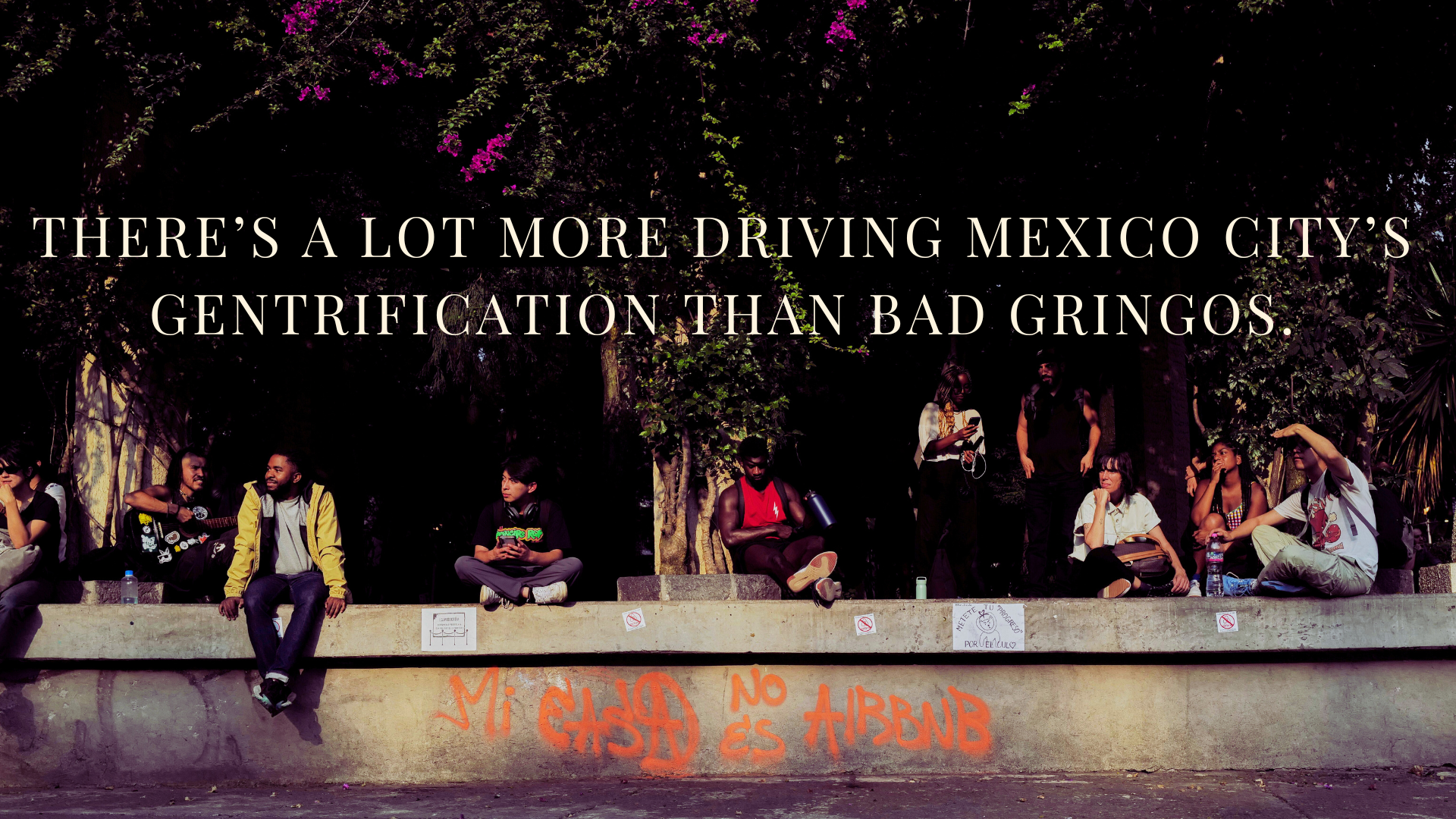
There’s a lot more driving Mexico City’s gentrification than bad gringos
by David Agren.
The acerbic signs and graffiti criticizing gentrification in Mexico City’s fashionable neighbourhoods were certain to capture international attention.
“Spanish is spoken here,” “Mexico for Mexicans,” and, “Go home,” read three of the screeds.
Social media couldn’t get enough of the disorderly protests – with the familiar masked vandals infiltrating yet another march and smashing up storefronts. The Mexico City police were curiously absent. An easy narrative of Americans abroad wearing out their welcome, while ICE cruelly rounded up Mexican migrants in cities such as Los Angeles.
The Department of Homeland Security jumped in with its own snark, posting, “Oh,” above an X Post with protester graffitiing the words, “Not your home,” and a protester waving a sign in English admonishing, “Pay taxes, learn Spanish, respect my culture.
Much of the international media, meanwhile, focused on the core matter of gentrification, which has spread through leafy neighbourhoods such as Roma, Condesa and Juárez – among others – over the past 15 years, driving up rents and forcing some long-term residents to move as their homes became short-term rentals.
The easy hook for any story on gentrification are…

Amid international fallout, a local tragedy
by Madeleine Wattenbarger.
Until last week, Ximena Guzmán Cuevas and José Muñoz were not public figures. Longstanding members of the ruling Morena Party, they both held senior positions in Mexico City’s government. Guzmán worked as Mayor Clara Brugada’s personal secretary; Muñoz as an adviser, coordinating closely with the national government, including on security issues. On Tuesday, May 20, a little after 7 a.m., Guzmán pulled over on a busy stretch of Tlalpan Avenue to pick up her coworker. A gunman fired twelve shots into the car, killing both Ximena and Pepe.
The assassination was timed for maximum visibility: up the road, in the National Palace and in view of the press, Security Secretary Omar García Harfuch informed President Sheinbaum of the events. She announced the news live to the nation.
A week later, information is scarce and the suspects remain at large. At a press conference the day after the murders, Mexico City’s top prosecutor, Bertha Alcalde Luján, and Public Security Secretary Pablo Vázquez Camacho refrained from answering questions about possible motives. The location, timing, and calculated execution suggest a professional hit: the assassins worked in a trio, used gloves to avoid leaving fingerprints, and escaped in a stolen car into the eastern fringes of Mexico State.

How illegal logging is fueling CDMX forest fires
by Madeleine Wattenbarger and Axel Hernández.
“Because I saw they were destroying the forest, I had to come take care of it,” says Jorge Luis Morales of his decision twenty years ago to join the Teporingos forest-protection brigade.
Wildfires and illegal logging threaten the forest around Morales’s home community of San Miguel Topilejo, Tlalpan, where last week flames ripped through about six hundred hectares of woods. Burns have worsened since 2020 thanks to combustibles left behind by illegal logging operations.
Topilejo sits on the far southern edge of Mexico City, where it harbors 6,000 hectares of a community ecological reserve. Part of the capital’s recently dubbed “water forest,” the area remains governed by a communal land-holding structure. The brigade members, part of the Topilejo community, work year-round to reforest, prevent blazes and keep the trees healthy. “We take care of the forest so that Mexico City can have water,” Morales says.

CDMX nightlife crackdown hits independent cultural spaces
by Madeleine Wattenbarger.
It was 8pm on a Thursday in March when officials from the Mexico City Institute of Administrative Verification (INVEA) showed up at La Caña, a seafood restaurant, LGBTQ+ bar and cultural center in the Doctores neighborhood. But the routine code check soured before it began.
“They arrived with excessive violence, with riot police, with high-calibre weapons,” recalls Ali Gua Gua, musician and representative of the cooperative-run space. “They came in pushing people, taking their tostadas away, yelling.”
La Caña hosts free concerts, literary events and cultural activities nearly every night. To make ends meet, it operates as a restaurant, with a permit that allows for the sale of alcohol with food. The night when the INVEA arrived, one table of diners was still awaiting their dinner order with two beers on the table. The officials seized on the momentary lapse: “They said, no, this isn’t a restaurant, this is a bar, and we’re going to shut you down.”





